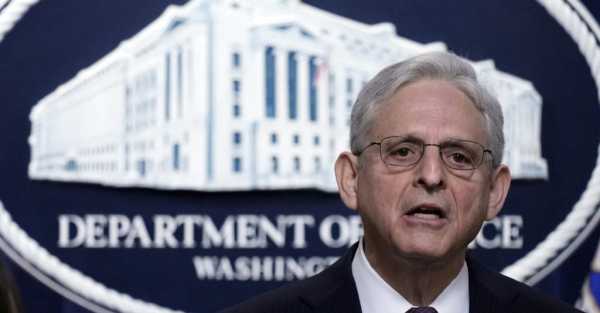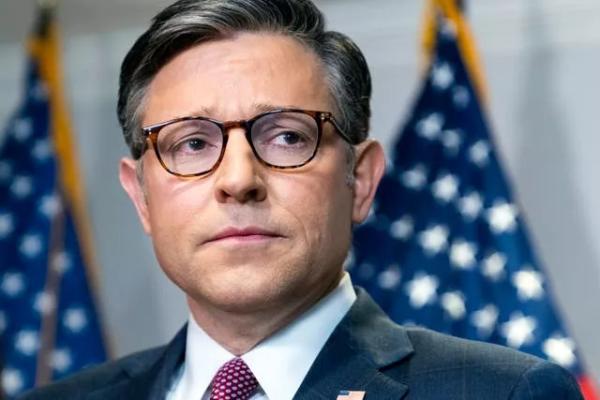
US attorney general Merrick Garland will not be prosecuted for contempt of Congress because his refusal to turn over audio of President Joe Biden’s interview in his classified documents case “did not constitute a crime”, the Justice Department said.
The department’s decision was revealed in a letter to Republican House Speaker Mike Johnson, citing the agency’s “longstanding position and uniform practice” to not prosecute officials who do not comply with subpoenas because of a president’s claim of executive privilege.
The Democratic president last month asserted executive privilege to block the release of the audio, which the White House says Republicans want only for political purposes. Republicans moved forward with the contempt effort anyway, voting on Wednesday to punish Mr Garland for refusing to provide the recording.
Assistant Attorney General Carlos Felipe Uriarte noted that the Justice Department under presidents of both political parities has declined to prosecute in similar circumstances when the president has claimed executive privilege.

Accordingly, the department “will not bring the congressional contempt citation before a grand jury or take any other action to prosecute the Attorney General”, Mr Uriarte said in the letter to Mr Johnson. The letter did not specify who in Justice Department made the decision.
Republicans were incensed when special counsel Robert Hur declined to prosecute Mr Biden over his handling of classified documents and quickly opened an investigation.
Republicans — led by representatives Jim Jordan and James Comer — sent a subpoena for audio of Mr Hur’s interviews with Mr Biden, but the Justice Department turned over only some of the records, leaving out audio of the interview with the president.
Republicans have accused the White House of suppressing the tape because they say the president is afraid to have voters hear it during an election year.
A transcript of the Hur interview showed Mr Biden struggling to recall some dates and occasionally confusing some details — something longtime aides say he has done for years in both public and private — but otherwise showing deep recall in other areas.
Mr Biden and his aides are particularly sensitive to questions about his age. At 81, he is the oldest-ever president, and he is seeking another four-year term.
The attorney general has said the Justice Department has gone to extraordinary lengths to provide information to the politicians about Hur’s investigation.
However, Mr Garland has said releasing the audio could jeopardise future sensitive investigations because witnesses might be less likely to co-operate if they know their interviews might become public.
In a letter last month detailing Mr Biden’s decision to assert executive privilege, White House counsel Ed Siskel accused Republicans of seeking the recordings so they can “chop them up” and distort them to attack the president.
Executive privilege gives presidents the right to keep information from the courts, Congress and the public to protect the confidentiality of decision-making, though it can be challenged in court.
The Justice Department noted that it also declined to prosecute attorney general Bill Barr, who was held in contempt in 2019. The Democratically controlled House voted to issue a referral against Mr Barr after he refused to turn over documents related to a special counsel investigation into former president Donald Trump.
The Justice Department similarly declined to prosecute former Trump White House chief of staff Mark Meadows after he was held in contempt of Congress for ceasing to co-operate with the January 6 Committee investigating the attack on the US Capitol.
Years before that, then-attorney general Eric Holder was held in contempt related to the gun-running operation known as Operation Fast and Furious. The Justice Department also took no action against Mr Holder.
Two former Trump White House officials, Peter Navarro and Steve Bannon, were prosecuted for contempt of Congress for defying subpoenas from the January 6 committee. They were both found guilty at trial and sentenced to four months in prison. Navarro has been behind bars since March, and Bannon has been ordered to report to prison by July 1.
The special counsel in Mr Biden’s case, Mr Hur, spent a year investigating the president’s improper retention of classified documents, from his time as a senator and as vice president. Mr Hur said he found insufficient evidence to successfully prosecute a case in court.
Mr Hur cited limitations with Mr Biden’s memory and the president’s co-operation with investigators that “could convince some jurors that he made an innocent mistake”.
Mr Hur’s report also described the president as “someone for whom jurors will want to identify reasonable doubt”.
Sourse: breakingnews.ie